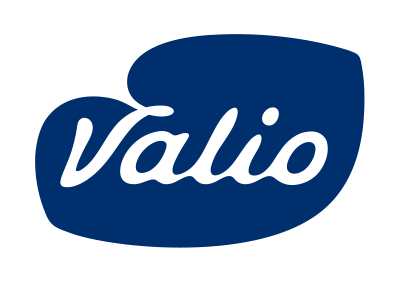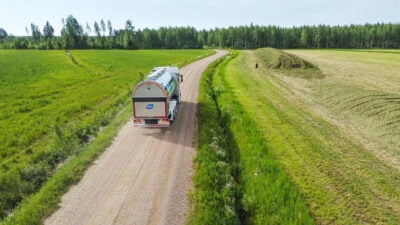In February 2019, our new milk collection truck that runs on LBG, liquefied biogas, will be rolling out to gather the milk we use to make Valio products. Using biogas as fuel helps to reduce the carbon footprint of milk collection, and it has a strong link to the idea of a circular economy: waste fractions of Valio’s production process are used to make biogas. The LBG milk collection truck will run the Southern Finland routes.
Climate change picks up speed, and food companies are in search of solution for slowing it down. Valio has an ambitious goal: we are aiming for a carbon-neutral milk. Improving our logistics and, for example, using biogas is one concrete action we can take to reduce our carbon footprint.
“We had been looking into using a biogas-fuelled milk collection truck for a few years already. Now, vehicle technology and the biogas distribution network has developed to the point that we wanted to start using a biogas-fuelled truck. I am happy and proud that buyers of for example Valio Luomu™ organic products can now do even more good. Small acts add up to a large effect,” says Valio category manager Mirva Tollet.
Valio is a company owned by some 5000 Finnish dairy farmers. In addition to Valio Luomu™ milk, the truck will also be used to collect other Valio milk. Our intent is to use the vehicle as much as possible, up to 24/7, to make its emission-reducing effect in the logistics chain as great as possible, as well as to collect as much experience on using the vehicle as possible. Regular milk and Valio Luomu™ milk are collected on different collection runs.
A safe thermos
Using biogas in heavy vehicles has only become possible recently, as the vehicles have been made efficient enough and a single tank can provide enough range.
“Valio’s new Volvo LBG 460 milk collection truck is basically the same to drive and is as efficient as a traditional diesel fuel truck. Some drivers and vehicle purchase decision-makers tend to still hold on to their old image of the first gas vehicles, which still had quite a lot of room for development,” says Volvo Finland sales director Reino Manninen.
Biogas also raises plenty of questions on safety – all unfounded. Liquefied biogas (LBG) is pumped into an insulated tank. In normal air pressure, LBG liquefies at -162 degrees. If any gas is released during refuelling or when the vehicle is running, it vaporises and mixes with the air very quickly.
“LBG has a very high flashpoint, i.e. the temperature it needs to ignite. The truck’s fuel tank is double-shelled and insulated with an underpressurised vacuum layer, like a thermos flask, to keep the gas at a cold temperature. In case the gas warms up and the tank pressure rises, the tank’s automatics releases the gas into the air in a controlled manner to lower the pressure. The temperature may rise if, for example, the vehicle is unused for a long time. In Valio’s case, the vehicle will be used efficiently, nearly 24/7, to gain the largest benefits from its features,” says Manninen.
Circular economy at its best
Valio intends to gather experiences on such a milk collection truck’s energy efficiency and general usage, and to make a decision on the future based on that. Its future plans are also influenced by how the heavy vehicle biogas distribution network, i.e. refuelling stations, expands.
“It’s great that Valio is making use of environmentally friendly biogas, which is made of biowaste, as fuel, and thus reducing the emissions of its cargo logistics. The production of renewable biogas is circular economy at its best, and it allows us to reuse biowaste efficiently. 40 percent of Finland’s traffic emissions are caused by heavy traffic, and that is why companies’ cargo logistics are under pressure to reduce emissions. One lorry engine, depending on its size, corresponds to roughly 40-50 personal cars when it comes to annual emissions. To reduce traffic emissions, we need pioneers like Valio,” says Gasum sales manager Juha-Matti Koskinen.
“Our processes, too, generate waste fractions that, while not useful to us, can be used to make biogas. This means we provide Gasum with raw material, which is then made into the LBG we fuel the truck with. We have other biogas-fuelled vehicles, such as a distribution truck and some company cars for staff. Reducing the carbon footprint of our whole logistics operation is significant to our goal, which is a carbon-neutral milk production chain, as our vehicles run a lot of mileage in transporting the milk and the products we make out of it,” says Valio development manager Petteri Tahvanainen.
The LGB milk collection truck runs its route in the hands of the transportation company Autoyhtymä Roimola. The company has committed to environmentally friendly operations long-term. The drivers have been rewarded on economic manner of driving since 2001. The company has also been awarded transportation company of they year by the Finnish Transportation and Logistics Organization (SKAL) for their environmental work.



